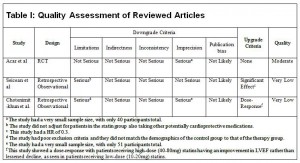Among Adult Cancer Survivors Treated With Anthracycline Chemotherapies, Concurrent Statin Therapy May Reduce Their Decline in Left Ventricular Dysfunction
ABSTRACT
Background: Anthracycline chemotherapies are used to treat a wide variety of malignancies. A study by Von Hoff et al showed that 2.2% of patients previously treated with anthracycline chemotherapy were later diagnosed with heart failure. A more recent study by Smain, et al, showed that 26% of patients receiving higher doses of anthracycline were later diagnosed with heart failure. Statins have been shown to have properties that may allow them to be cardioprotective. Animal research performed by Henninger et al suggests that statin therapy is beneficial for reducing anthracycline-related cardiotoxicity in mice. It also lends evidence supporting the theory that, among adult cancer survivors treated with anthracycline chemotherapies, statin therapy may reduce their decline in left ventricular dysfunction, which is the aim of this systematic review.
Methods: An exhaustive search using MEDLINE-Ovid, ClinicalKey, and Web of Science was performed using the terms: statin, anthracycline, and heart failure. Studies were excluded if they were review articles, opinion-based articles, animal studies, published over five years ago, or written in a language besides English. Articles were assessed for quality using the Grading of Recommendations, Assessment, Development, and Evaluation (GRADE) criteria.
Results: Three studies met criteria and were used in this systematic review. A randomized controlled trial by Acar et al found that the mean reduction in left ventricular ejection fraction (LVEF) was significantly lower in the statin group than the control group (P < 0.0001). A retrospective observational study by Seicean et al found that only four cases of heart failure requiring hospitalization occurred in the group receiving statin therapy, as opposed to 23 cases in the control group (P = 0.03; HR: 0.3). Another retrospective observational study by Chotenimitkhun et al showed a statistically significant, linear, dose-response relationship between the amount of statin given daily and the decline in LVEF (P = 0.02).
Conclusion: Overall, the quality of evidence supporting the use of statin therapy concurrently with anthracycline treatment is low. However, the data from these studies is significant and warrants further investigation. Statins are generally well tolerated medications and benefits have been shown to occur with less than one year of therapy. The evidence would argue that the benefits of using statins concurrently and for six months following anthracycline chemotherapy outweigh the risks unless otherwise contraindicated.
Keywords: Heart Failure, anthracycline, chemotherapy, statins
(Click on image to enlarge.)
REVIEWED STUDIES:
Seicean, S., Seicean, A., Plana, J. C., Budd, T., & Marwick, T. H. (2012). Effect of statin therapy on the risk for incident heart failure in patients with breast cancer receiving anthracycline chemotherapy.Journal of the American COllege of Cardiology, 60(23), 2384-2390.
Chotenimitkhun, R., D’Agostino, R., Lawrence, J., Hamilton, C., Jordan, J., & Hundley, W. (2015). Chronic statin administration may attenuate early anthracycline-associated declines in left ventricular ejection function.Canadian Journal of Cardiology, 31(3), 302-307.
AUTHOR: Mariah McGaffey is currently completing her second year in the School of PA Studies at Pacific University, Oregon. She will graduate with an MS degree in August, 2016.


No Comments Yet